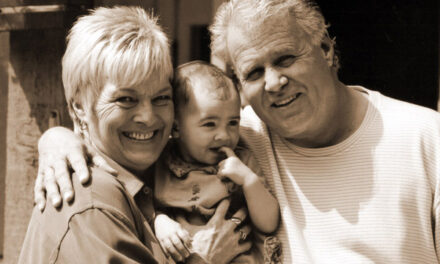The start of another school year comes with a reminder to be engaged grandparents. There are many ways we can be involved in our grandkids’ education, whether we have a role in helping with homework or tutoring them directly, or we’re simply interested and encouraging about their schoolwork.
One other way we can be involved is simply being a listening ear or a sounding board for them.
When grandkids start going to school, it’s a major step in establishing a life outside of home and away from Mom and Dad. Obviously, they will go through major changes by the time they graduate from high school, and one change we may not think about as much is the gradual increase in independence. Each year their lives become a little bit more “out there in the world” and a little less about what happens at home. Friends, sports, hobbies, and school become bigger and bigger influences. Parents often become less and less “cool” in their eyes.
As a grandparent, you might have a role to play in these dynamics.
Growing up is hard. And as your maturing grandchild experiences various challenges, he might not always want to talk about them with his parents. We can hope and pray that those parent-child relationships are strong and have open communication, but things don’t always happen that way. There are behavior battles and discipline disputes that have an effect. And as you know, no parents are perfect, just like all grandkids have their own issues and problems.
The grandparent-grandchild bond is unique and special in many ways, and it often bypasses a lot of those issues since there’s a little bit of distance. You’re kindred spirits to a degree. As a grandparent, you probably don’t have to be as concerned about correcting a grandchild’s behavior; you get to just enjoy spending time and investing in her. Your grandchild also feels that difference and might be more open to asking you some thoughtful questions or talking with you about issues at school or with friends.
In today’s world it’s getting trickier when it comes to what children are learning at school—and what the schools communicate to the parents about it. The kids might be afraid to bring up a serious concern with their parents, although they are likely talking with their peers about nearly everything. So your grandchild might have some pretty heavy questions and not have a reliable source for answers.
That’s where you can play an important role as a confidant. But what should you do, practically?
Continue to form strong bonds with your grandkids—at every age.
If they’re still young and these kinds of issues aren’t relevant yet, remember that they will be eventually. You’re planting seeds and forming patterns in how you relate to each other. And over time, if you have been consistently available for your grandkids and you’ve built strong relationships with them, it’s much more likely that they will come to you with a question or concern.
Be a place of safety.
Show them in many ways that you’re on their side, willing to support and encourage them no matter what. If they do come to you about a tough situation, maybe more than anything they probably just need to hear that they are loved and things are going to be okay. You’ve lived long enough to know that’s true—and giving them love and comfort is probably easy and natural for you.
Be ready for just about anything.
Literally, anything. Once again, it’s a different world that they’re growing up in today. You’re probably aware of the cultural and social changes that are happening, and whether or not you agree with them, they are likely influencing your grandchildren. So don’t be shocked or outraged by anything, and start thinking through some “What if?” scenarios. Maybe even talk through some with your grandkids’ parents, to see how they would want you to handle them. It might not be fun to imagine some change or challenge coming to a grandchild’s life, but if you’re prepared it will be much less difficult to handle. And you can respond with love even if it’s difficult.
(Note: If a grandchild is about to reveal something really serious, it’s good to make something clear with him: “I won’t tell anyone unless someone could be harmed in some way if we don’t.” Usually he will still want to tell you. And if you determine that his parents really need to know something, a good question to ask is, “Do you want to tell your parents, or do you want me to?”)
How have you been a trusted sounding board for a grandchild—and what have you learned in the process? Share an insight or two and interact with other grandparents on our Facebook page.





